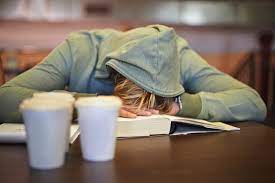
Caffeine, a popular stimulant found in coffee, tea, energy drinks, and sodas, has become a common part of many high school students’ daily routines. While some caffeine intake may have some benefits for adults, its effects on high school students can be negative in several ways.
Firstly, caffeine can negatively impact sleep patterns. High school students often struggle with their academics and busy schedules, leading to irregular sleep schedules. Consuming caffeine, especially in the afternoon or evening, can disrupt their ability to fall asleep and lead to non-restful sleep. This can result in daytime drowsiness, decreased concentration in class, and lowered academic performance. “Whenever I have an energy drink during lunch, I see that energy for an hour, then by my last class of the day, the drowsiness kicks in” says a Holy Family student.
Secondly, excessive caffeine consumption can contribute to increased anxiety and stress levels in high school students. High school is already a period of increased emotional sensitivity and stress due to academics, social challenges, and hormonal changes. Caffeine acts as a stimulant that can influence feelings of anxiety, restlessness, and irritability, making it difficult for students to deal with school and daily life.
Thirdly, the habit of relying on caffeine for energy can lead to tolerance over time. High school students may develop a tolerance to caffeine, requiring larger amounts to achieve the same stimulating effects. This can lead to a cycle of increased consumption, which in turn can have bad effects on their overall health and well-being. “I see myself having to drink two energy drinks per day to get the effect that I want due to all of the caffeine I drink” says another Holy Family student.
Lastly, frequent consumption of caffeinated beverages can contribute to dehydration. Many high school students may not drink enough water throughout the day, choosing to drink caffeinated drinks instead. Dehydration can lead to fatigue, headaches, and difficulty concentrating, impacting academic performance and overall health.
In conclusion, while caffeine may provide a temporary boost in energy and alertness, its negative effects on sleep, mental health, tolerance, and hydration make it a concern for high school students. Encouraging healthy sleep habits, and self-control in caffeine intake can help lower these risks and promote the well-being of high school students.
